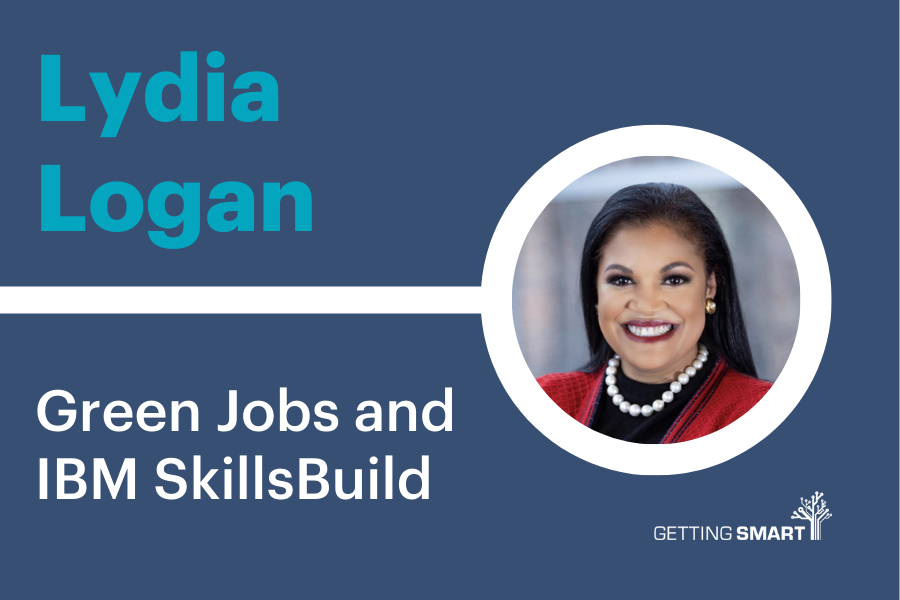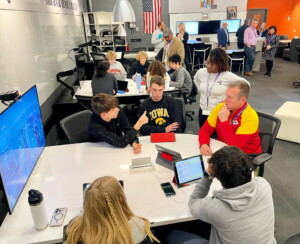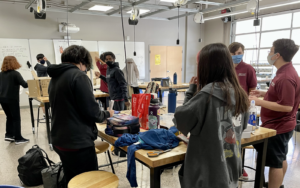Lydia Logan on Green Jobs and IBM SkillsBuild
Key Points
-
40% of companies believe they will need to reskill their workforce in the coming years.
-
Green skills are here to stay and many of the jobs will be tech jobs.

Join your community March 4-7 in Austin, Texas for SXSW EDU 2024 to help create a new tomorrow for learners everywhere! Go to sxswedu.com/attend/ to learn more.
On this episode of the Getting Smart Podcast, Tom Vander Ark is joined by Lydia Logan, Vice President, Global Education and Workforce Development, Corporate Social Responsibility at IBM.
Prior to IBM, she led the Verizon Innovative Learning Schools initiative that provides technology and training to more than 500 under-resourced public schools. She served as senior policy director at the Eli and Edythe Broad Foundation, where she drove education policy and philanthropic investments to improve the management, quality, and transparency of public schools. Lydia also served as the vice president of programs for the Kimsey Foundation, where her grant portfolio improved educational outcomes at under-resourced public schools, and helped low-income families bridge the digital divide. In addition, she was VP and executive director of the Institute for a Competitive Workforce at the U.S. Chamber of Commerce, where she led national policy and program initiatives to improve education and workforce development. Earlier in her career, she led Chiefs for Change, a national membership organization of Chief State School Officers.
Together, Lydia and Tom talk about the credentialing landscape, the rise of green skills and how IBM is bridging those worlds with SkillsBuilds.
Links:
- Lydia Logan
- Press Release
- IBM SkillsBuild
- IBM Commits to Train 2 Million in Artificial Intelligence in Three Years, with a Focus on Underrepresented Communities
- IBM Commits to Skill 30 Million People Globally by 2030
- Justina Nixon-Saintil on Corporate Social Responsibility and the Rise of P-TECH
Transcript
Tom Vander Ark: The world is changing fast with new tools and new jobs, and that’s why we need new pathways. You’re listening to the Getting Smart podcast. I’m Tom Vander Ark, and today I’m joined by my friend Lydia Logan. She’s a VP of Global Education, Workforce Development, and CSR at IBM. Hi Lydia, it’s a treat to reconnect. We appreciate your two decades of ecosystem leadership, Lydia.
Lydia Logan: Hi Tom, it’s great to be here.
Tom Vander Ark: We’ve connected in the couple of years that you’ve been at IBM, but we appreciate your leadership at Digital Promise. You ran Chiefs for Change, and you ran a Workforce Institute at the US Chamber. You’ve been in philanthropy; you’ve just been an important ecosystem leader for all the years that I’ve been involved in education. That’s why it’s such a treat to reconnect in the new year.
Lydia Logan: Well, thank you. It’s been a pleasure. I think we’ve followed each other around in a bit of a musical chairs kind of ecosystem world. So it’s great to be back with old friends.
Tom Vander Ark: Lydia, we’ve featured IBM a couple of times in the last five years, not only for its work with SkillsBuild but also for its support for P-TECH schools. It’s been such an important decade-long effort at IBM. P-TECH, for listeners that don’t know, are early college high schools that combine an accelerated pathway towards new technology jobs with some work-based learning opportunities. IBM helped stand up the first ones in New York, and now there are about 300 around the world, soon to be 600 because there’s lots of fans of that model. So Lydia, we just appreciate IBM’s leadership in education and technology.
Lydia Logan: Well, thank you. I think one of the things that IBM has done for at least the last 50 years is to be a catalyst. We look at our corporate social responsibility the same way, and P-TECH is another example of that—looking at how the system could be done better, what’s missing, and how IBM can bring to bear its technology, talent, and resources. “Let’s create” is our tagline these days. How do we create the things that make the world work better? For 10 years, IBM was looking at pathways and P-TECH as a leading model for that. Now it’s really taken off, and states are owning it and scaling it. We’ve been able to look at new models as online learning and credentials come about. I know we’ll get into some of these things and short-form programs, but how can we now look to the future of work and see where we can really lean in there?
Tom Vander Ark: Yeah, for more than a decade, IBM has really been the leader in developing and credentialing new technology skills. We’ll talk more about that, but we appreciate IBM’s early leadership on that front. In the last two months, you’ve made some really extraordinary announcements. First, in September, IBM made the commitment to train 2 million people in AI in three years with a focus on underrepresented communities. Then you followed that up with an even bigger announcement, committing to help scale up 30 million people globally by 2030. Wow.
Lydia Logan: We did. We did the 2030 commitment first, but yes, they’re both true.
Tom Vander Ark: They’re connected. Let’s unpack both of those. Maybe we can start with the Gen AI since that’s such a hot topic. What are you doing there?
Lydia Logan: Sure. It’s clear that work is being transformed by generative AI, and it’s important for everyone to understand what it means for our lives today. How can it make us more efficient? How will it transform companies but also individuals? What does it mean to each of us? What do we need to know about it? Where does it intersect with our cybersecurity? I think that’s one thing people may not be talking enough about. How do you know what a safe and secure model is? When do you not put your personal information in there? Given the audience for this podcast, I just want to make sure that people are thinking about those two things together. Make sure you’re protecting yourself while trying out some of these new and exciting models. Ethical and secure AI is something IBM is really passionate about making sure it’s safe.
Tom Vander Ark: Who are the Gen AI training courses for? What’s the use case or use cases?
Lydia Logan: We’ve got opportunities for high school students and teachers, university students and faculty, and for adult learners. It’s all available on SkillsBuild, so you can come to SkillsBuild.org, create an account, and start learning for free. We wanted to make sure that it’s broadly available. I spent time at the World Economic Forum in New York, and they are leading a global initiative called the Reskilling Revolution. The IBM Institute for Business Value has been putting out reports for CEOs on the future of work and trends that CEOs should keep an eye on. Their recent study of CEOs said 40% of those implementing AI in their companies expect to have to reskill their workforce. Big companies like IBM can do that, and we do. Our IBMers are expected to do a minimum of 40 hours of learning every year, and we get credentialed for that learning as we go, which is one reason why we pay such close attention to credentialing and have a credential board and an entire system internally. We use that externally as well. We wanted to make the kind of learning we do at IBM available to the public so people are not left behind. It’s what we do for our clients, whether through our consulting business, and through corporate social responsibility, we make that learning available for free on SkillsBuild.
Tom Vander Ark: That’s great. So these generative AI short courses and credentials can be pulled into a computer science class, an intersession, a summer school program, or even during winter break?
Lydia Logan: Absolutely. We’ve got plenty for people to try. They can do it over winter break or long weekends. Some of these courses are a few hours long; longer bundles are ten hours or more. Students wanting to beef up their resume for college applications, teachers infusing their curriculum with supplemental materials, or even parents and students learning together—all of these are possible applications.
Tom Vander Ark: I love that. You could do it as an individual, a small cohort, or a whole class. Lots of options. And it’s open to students as well as teachers. This seems like it has to be a real priority, particularly for high schools and colleges. It’s so important for juniors and seniors to graduate with a level of AI literacy, and this is such a great free, open way for students to do it.
Lydia Logan: Absolutely. When you look at stress levels in the workplace, a lot of it comes from repetitive administrative tasks, which are easily managed by AI. Large language models and generative AI can provide answers very quickly. For example, someone fed a 600-page report into an AI and got a 5-page summary back, which was about 95% accurate. Understanding how to apply AI is crucial. There’s a lot of fear mongering about AI taking people’s jobs. I’d say it’s less about jobs being taken and more about understanding how to use AI to improve the job you have. AI is transforming work, and we don’t know what all the new jobs will be. Everyone needs to lean in and keep up. For teachers, don’t tell your students not to use AI. Think about how they can use it and how you might transform your teaching practice. If students use generative AI to write papers, they should still understand and defend the content.
Tom Vander Ark: You mentioned cybersecurity and data privacy. Are those also topics available on SkillsBuild?
Lydia Logan: Yes, absolutely. Cybersecurity is a big priority for IBM, and we look at the intersections of these topics. We have a big initiative with HBCUs around the country on cybersecurity. Twenty of them have cybersecurity leadership centers with us, where we’ve connected subject matter experts and our Cybersecurity Academy, which our clients use. They’re also learning on SkillsBuild, taking an introduction to threat hunting class and more. We’ve got cybersecurity curriculum on SkillsBuild, free and available to everyone. Be mindful, as bad actors are getting smarter with phishing and scams using tools like AI. It’s important to be aware when putting your personal information out there.
Tom Vander Ark: We’ve made sustainability a big priority at Getting Smart. We’re excited about sustainability and clean tech pathways. We think it’s not only a growing sector but also the biggest entrepreneurial and impact opportunity in the world. You’ve announced and are working on some new learning experiences in that category. What can you tell us about that?
Lydia Logan: We’ve got a collaboration with AXA, releasing new content for all our learning categories—high school students and teachers, university students and professors, and adult learners. We’re starting with foundational content on climate change and its challenges, moving to level 2 content where learners understand what they can do to make a difference, the necessary skills, and how data and technology come together in green jobs. We’re seeing a convergence of greening technical jobs and technology in green jobs. It’s important for students and adults to start thinking about these skill sets.
Tom Vander Ark: You mentioned a teaching sustainability toolkit. What’s that?
Lydia Logan: The toolkit is great because it’s something teachers can use as supplemental materials. They can integrate it into the classroom, and volunteers and parents can use it. It’s designed to convey basic sustainability concepts for students with some actionable steps. It also includes skills like data analytics and understanding how these skills apply to green jobs. We wanted to ensure we had resources applicable to classrooms in flexible ways. Teachers can pick what they need, whether it’s for classroom learning or as an extracurricular activity.
Tom Vander Ark: I’m really glad to hear that. As I mentioned, I think clean tech will be the most important sector of our economy, and we want to make sure everyone has access to quality learning experiences in that space. How do you distribute these materials? How can people access them?
Lydia Logan: All of this content is available on SkillsBuild, and people can go to the site and sign up. We’re trying to make it as broadly accessible as possible, partnering with organizations to distribute the materials. For example, with the cybersecurity curriculum, we partner with HBCUs to help get the word out. We’re constantly looking for partners and new ways to get this content to more people. We want to ensure anyone interested in learning has access to these opportunities.
Tom Vander Ark: Great. Before we go, any advice for educators and school administrators as they wrap up the year and start planning for next year?
Lydia Logan: Think about the skills your students will need in the future, not just the next grade or the next test. Focus on real-world skills like data literacy, AI literacy, and sustainability. Encourage students to be curious and explore different pathways. Prepare them for a future where they will need to continuously learn and adapt. That’s what IBM is doing, and we believe it’s critical for everyone.
Tom Vander Ark: Thank you so much, Lydia. It’s always a pleasure to catch up. Thank you for your leadership and everything IBM is doing to prepare the next generation for the future of work.
Lydia Logan: Thank you, Tom. It was great to be here.
Tom Vander Ark: Thank you, listeners, for tuning in. We hope you enjoyed today’s conversation. Until next time, keep learning and stay curious.







0 Comments
Leave a Comment
Your email address will not be published. All fields are required.